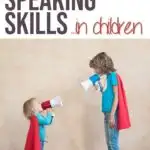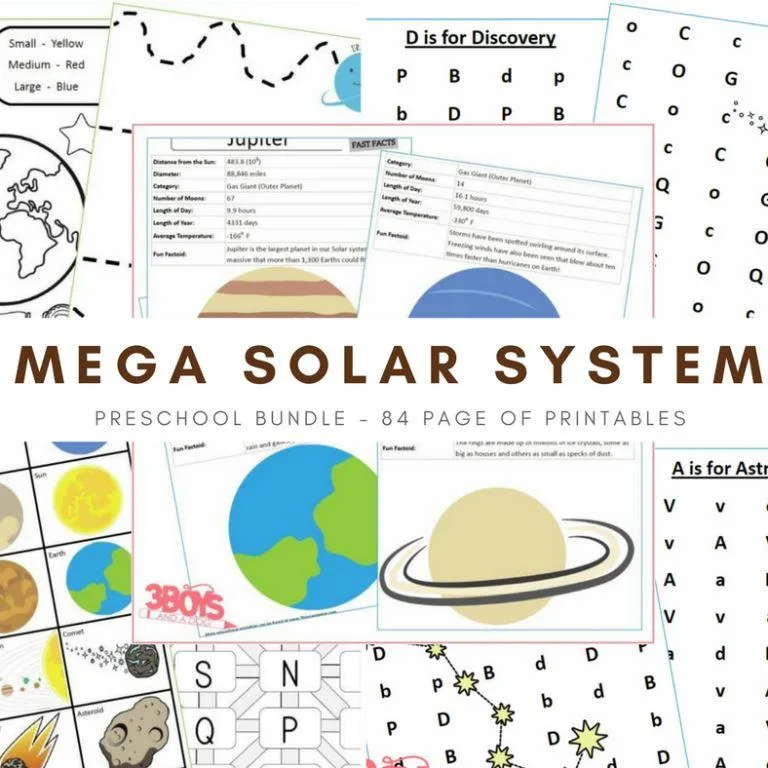When it comes to fostering the development of children, the first thing that comes to mind is their language skills.
Children’s language and communication abilities are critical in their early life and crucial to their overall growth and development.
As a mom, homeschooler, or preschool teacher, you play a vital role in helping your child grasp language well.
However, teaching and cultivating language skills is easier said than done.

In this blog post, we’ll share everything you need to know about nurturing language skills in your children, including the importance of activities that can promote it and how to foster a learning environment that supports independent development.
What are language skills?
Language skills are the abilities that enable children to communicate with others. It includes their ability to convey their thoughts and ideas, understand what others are saying, and express their feelings in words.
Language skills are typically divided into two main categories: receptive language and expressive language. These categories help us understand the different aspects of a child’s language development and communication abilities.
Receptive Language:
This refers to a child’s ability to listen to and understand language. It involves the recognition and interpretation of what is being said to them.
For example, when you tell a child to put their toys away, their ability to understand your instructions and act accordingly demonstrates their receptive language skills.
These skills begin to develop right from infancy when babies recognize their mother’s voice and respond to simple commands.
As children grow older, their receptive language skills become more sophisticated, allowing them to follow complex instructions, understand stories, and grasp abstract concepts.
Expressive Language:
This refers to a child’s ability to express their thoughts, feelings, and ideas through speech.
It involves everything from babbling as an infant to speaking in complete sentences as a child. Expressive language skills include naming objects, describing actions and events, forming sentences, using grammar correctly, and telling stories.
These skills are crucial for children to communicate effectively with others.
Both receptive and expressive language skills are essential for a child’s overall language development. They enable effective communication and are foundational to reading and writing skills.
A child’s struggles in either of these areas may impact their ability to interact with others, express their needs and emotions, and succeed academically.
Therefore, parents and educators need to support the development of receptive and expressive language skills from an early age.
Why are language skills important?
Developing good language skills is essential for several reasons. First, it is crucial for social and emotional development. Children with good language skills can express their feelings, understand others’ emotions, and confidently engage in social interactions.
Language also plays a significant role in academic success. Children with strong language skills can understand instructions, follow classroom discussions, and express their ideas effectively.
Social and Emotional Development:
Language is the primary tool for expressing and understanding emotions. Children with good language skills can articulate their feelings clearly, understand others’ emotions, and respond appropriately.
This ability to communicate effectively helps them form strong relationships with peers and adults, boosts their self-esteem, and fosters emotional well-being. For instance, a child expressing that they’re upset rather than resorting to a tantrum is likely to have healthier social interactions.
Academic Success:
Language skills are fundamental to learning in all subjects. Children with strong language skills can comprehend instructions, participate in classroom discussions, read and write effectively, and express their ideas clearly.
They can also ask insightful questions, build on others’ ideas, and engage deeply with the learning material.
For example, a child with robust language skills is better equipped to write an essay, understand a math problem, or participate in a science discussion.
Cognitive Development:
Language skills also contribute to cognitive development. Language enables children to think more abstractly, reason logically, and solve problems effectively. It helps them understand and organize their thoughts, remember information, and learn new concepts.
For instance, a child uses language to categorize objects, make connections between ideas, and narrate events in a logical sequence.
Future Opportunities:
Good language skills can open up a world of opportunities in the future. They are critical for success in higher education and the workplace, where effective communication is highly valued.
Whether it’s writing a compelling university application, acing a job interview, or delivering a persuasive presentation, robust language skills can give individuals a significant advantage.
In essence, language skills are much more than just a means of communication – they are integral to a child’s social, emotional, academic, and cognitive development and can significantly influence their prospects.
Activities to promote language skills
There are many easy and fun activities to promote language skills in children. You can encourage your child to develop their communication skills while playing, reading, or even doing household chores.
For example, you can play games like “I Spy” or “What’s Missing?” to help your child develop vocabulary and descriptive language.
Reading books aloud to your children is an excellent way to promote language skills, as it exposes them to new words and ideas. You can even encourage them to retell the story in their own words or act out the characters.
Singing, rhyming, and reciting poetry are fantastic ways to build language skills.
Talk, talk, talk!
One of the best things you can do to support your child’s language development is to talk to them as much as possible. Whether you’re cooking dinner, driving to the store, or playing at the park, keep a running commentary on what you’re doing and what your child is doing.
Use simple, clear language, and introduce new vocabulary words whenever you can. For example, if you’re out for a walk and see a squirrel, point it out and say, “Look, there’s a squirrel! Do you see it?” Encourage your child to respond with words or gestures, and praise them for their efforts.
Read together.
Reading is a great way to introduce your child to new vocabulary, concepts, and ideas. Choose age-appropriate books that are engaging and colorful, and make reading together a special time in your daily routine.
As you read, ask your child questions about the story and the pictures, and encourage them to make predictions or connections. Don’t be afraid to repeat the same books repeatedly, as this will help your child internalize the language and concepts over time.
How Do Dinosaurs Go to School?How Do Dinosaurs Collection. 6 Books (HowHow Do Dinosaurs Count to Ten?How Do Dinosaurs Play with Their Friends?How Do Dinosaurs Get Well Soon?How Do Dinosaurs Learn to Read?
Play with language.
Language learning doesn’t have to be dull! You can make it fun and playful by incorporating games, songs, and rhymes into your daily routine. For example, you can play “I Spy” or “Simon Says” to practice vocabulary and sentence structure, or you can sing silly songs or recite nursery rhymes to boost memory and rhythm.
You can also play with puppets, dolls, or action figures to create imaginary dialogues and scenarios that reinforce language skills and social skills.
Singing.
Singing is an excellent way to promote language skills in young children. Not only does it expose them to new vocabulary and sentence structures, but it also helps with memory and rhythm. You can sing nursery rhymes and popular children’s songs or make up your silly ones together.
Encourage your child to sing, clap their hands, or move their bodies to the music. This will not only make language learning fun but also help with motor skills and coordination.
Use technology wisely.
Technology can be valuable for promoting language skills if used wisely and appropriately. Many educational apps, games, and programs are designed specifically for young children to develop their communication skills.
However, set limits on screen time and use technology as a supplement, not a replacement for real-life interactions.
Make sure to engage with your child while using technology, ask them questions, and encourage them to explain what they’re doing or learning.
Rhyming.
Rhyming is a fun and effective way to improve language skills, especially in younger children. It helps with vocabulary building and enhances phonemic awareness – the ability to identify and manipulate individual sounds in words.
You can read rhyming books, play simple word games, or create silly rhymes.
For example, you can start a sentence with, “I like to eat…” and have your child complete it with a word that rhymes, such as “meat” or “treat.” This activity can be endless fun and help your child learn new words along the way.
Playing with Poetry.
Poetry is a beautiful and creative form of language that can help children develop their imagination and uniquely express their thoughts and feelings.
You can introduce your child to different types of poetry, such as nursery rhymes, haikus, or limericks, and encourage them to create their poems. This activity not only promotes language skills but also boosts creativity and self-expression.
By engaging in fun activities that incorporate language learning into everyday life, parents can help their children develop strong communication skills that will benefit them in the future. Remember to make it enjoyable and age-appropriate, praise your child’s efforts
Fostering an environment for a child to develop language skills independently
While it’s important to promote your child’s language development actively, it’s also vital to create an environment that fosters independent development. You can achieve this by providing opportunities for your children to be curious and explore the world around them.
Fostering a supportive and encouraging environment is crucial for a child’s language development. Here’s how you can do that:
Encourage Questions:
Curiosity is a powerful driver of learning. Encourage your child to ask questions about everything around them. It helps them acquire new knowledge and promotes critical thinking and problem-solving skills.
Responding patiently to their queries can make them feel valued and confident in their pursuit of knowledge.
Promote Exploration:
Allow your child to explore new things, ideas, and experiences. Whether it’s trying a new activity, reading a different kind of book, or visiting a new place, these experiences can introduce them to new words and concepts, enhancing their vocabulary and understanding.
Provide a rich language environment.
Children learn best when they are surrounded by rich and varied language input. This means exposing your child to different types of talk, such as adult, peer, and infant-directed. It also means providing diverse language models, such as different accents, dialects, and languages.
If you’re a homeschooler or a preschool teacher, you can create a language-rich environment by using language-rich materials, such as books, posters, games, and videos.
Support Free Expression:
Encourage your child to express their thoughts, feelings, and ideas freely. It can be through speech, writing, art, or any other form of creative expression. Celebrate their unique perspectives and ideas, boosting their confidence and fostering creativity.
Avoid Interrupting or Over-Correcting:
While it’s important to guide your child and correct their mistakes, doing so too quickly or frequently can discourage them from expressing their thoughts. Instead, listen attentively when they speak, acknowledge their efforts, and offer constructive feedback gently and positively.
Expand on Their Ideas:
When your child shares an idea or observation, try to build upon it. For instance, if they say, “The sky is blue,” you could add, “Yes, it’s a beautiful clear blue today, isn’t it?
On some days, it changes to grey when it’s cloudy.” This not only enhances their understanding but also shows that you value their contributions.

By adopting these strategies, you can create a nurturing environment that supports your child’s language development and overall growth.
Being intentional and consistent in teaching and nurturing your child’s language skills is essential for their growth and success. You can make it fun for them by using simple activities that encourage learning through play and exploration.
Shop My Learning Printables:
The following homeschool picks of mine can be found in my shop. Simply click the image that interests you!
Remember that good communication skills are foundational for your child’s future success, so don’t be afraid to incorporate language development into your child’s everyday life.
With your support and dedication, your child will develop into a confident and competent communicator.





















